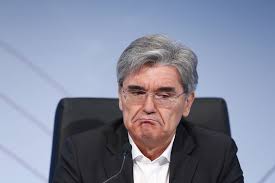By Aaron Ukodie, with Agency reports
Siemens, the power and transport giant of German and Europe’s largest conglomerate, on whose shoulder president Muhammadu Buhari government is resting on for solution to the country’s power woes, is worried on account of emerging significant weaker business environment in its key markets, as its last quarter, ending June 2019, business profit dipped by 6 per cent.
The German industrial group said profit slipped 6 per cent to €1.14bn in the three months to the end of June, largely due to declines in its digital industries and gas and power businesses.
But the news of the deal that the German giant signed with the Nigerian government may have given it some hope, as the contract when fully executed would bring significant impact on its 2019, and beyond, outlook.
Though both Siemens and Nigerian government officials are mute about the financial details of the deal, observers are of the view that the amount would be significant enough to gladden German officials hearts.
When Siemens signed a $9 billion deal with Egypt in 2015, the company said the contract would add 16.4 gigawatts (GW) to Egypt’s national grid (with a capacity of 14,400MW.)
The Nigeria power deal is expected to bring production of 25,000 megawatts of electricity by 2025.
Though the German company is efficient and oftentimes provide robust and timely solutions, past indicators show that their project costs are often on the high end.
Joe Kaeser, chief executive, who was in Nigeria last month to seal the Nigerian deal, said some few hours ago, in Munich, that Siemens had been weighed down by “a significantly weaker environment in our key markets.”

“Geopolitics and geo-economics are harming an otherwise positive investment sentiment,” Mr Kaeser said.
Europe’s economy has been weighed down by global trade tensions and softening demand from China, while last week a closely watched survey of German factory executives reported that industry conditions are in “free fall”.
Siemens confirmed its full year outlook despite the headwinds, as orders grew 8 per cent to €24.5bn, and revenue rose 4 per cent, to €21.3bn. Its order book was boosted by strong performance from its renewable energy and mobility businesses.
The conglomerate has previously announced plans to spin off its ailing gas and power division and publicly list the carved out unit in September 2020. Siemens would give up its majority stake but “remain a strong anchor shareholder”.
In the most recent quarter the unit reported a decline in revenues following “a weak order period.”












